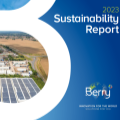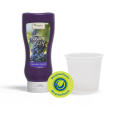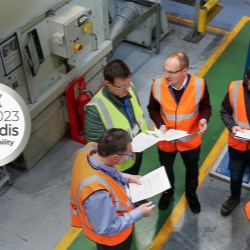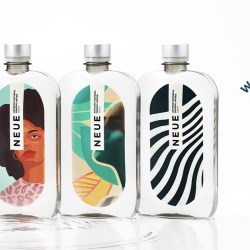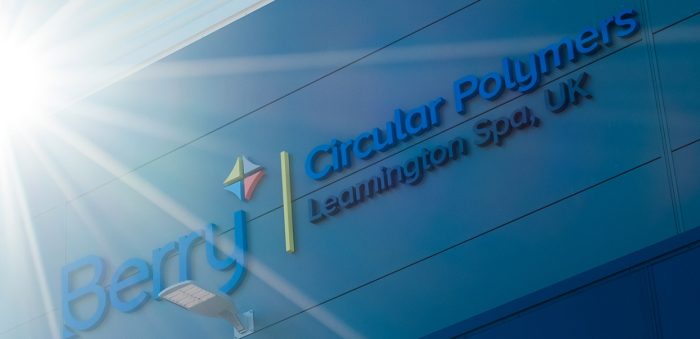

Increased plastic packaging recycling and the incorporation of this collected material into new packaging is critical for continuing progress towards a circular, net-zero economy. As a global leader, Berry Global is dedicated to producing enough recycled content to give plastic multiple lives and keep resources in use and out of the environment.
According to a report in Packaging Europe, mechanical recycling has been shown to have the lowest impact on the environment, but until now, only recycled PET (rPET) and a limited number of single source streams have been of a high enough standard for contact-sensitive applications in major markets such as food and beverage and cosmetics and personal care.
Berry’s CleanStream® process was therefore conceived to develop the world’s first closed-loop system to mechanically process domestically recovered household waste polypropylene (PP) back into food-grade packaging. As an integral part of our Impact 2025 strategy, the technology helps us, and our customers make progress towards ambitious sustainability goals.
This White Paper outlines the development of CleanStream® and our progress to date.
Creating the ‘Ideal’ PCR Plastic
Located in Leamington Spa, UK, Berry Global Circular Polymers is one of the largest plastics recyclers in Europe, with a wealth of industry knowledge and expertise. The Circular Polymers team therefore came together for an initial discussion around what would constitute the ideal post-consumer recycled (PCR) material that could be made available at scale to meet the growing needs of companies throughout Europe.
Mechanically processing domestically recovered household plastic waste back into food-grade packaging helps to close the loop for contact-sensitive cosmetics, personal care, and food applications.
CleanStream® significantly enhances the capabilities of traditional mechanical recycling. Not only mechanically recycling domestically recovered household plastic waste but also washing, sorting, and separating it to produce lower carbon, food-grade recycled plastic.
Replacing simple, material-based sorting with multiple sorting steps, this technology delivers ultra-high levels of polymer purity through:
- Proprietary, artificial intelligence-based product identification designed to remove non-target non-food items
- An upgraded decontamination process specifically designed and optimised for PP
- A range of custom-made extraction and screening tests that fully characterise the composition of the material down to the parts per billion (ppb) level
The process offers notable advantages over other types of recycled plastic. Unlike regularly mechanically recycled plastic, CleanStream® recycled PP has been extensively tested across a range of products and processes to ensure it meets the rigorous standards for food contact safety, including no odour, taint, and low migration.
The Scale to Deliver
A project of CleanStream®’s complexity required a vast range of experience, including combining a multifaceted research and development task with a major infrastructure project, both of which Berry was uniquely positioned to deliver.
The new state-of-the-art UK plastic recycling facility in Leamington Spa can recycle nearly 40% of all the available sorted PP waste in the United Kingdom. Leveraging our global footprint and leading supplier partnerships, we have secured access to 50,000 tons of UK kerbside collected PP waste annually – or more than 1 billion individual packaging items – to address our customers’ sustainability objectives on a global scale.
Equally important, Berry is also one of the world’s largest plastic packaging manufacturers with extensive knowledge, experience, and understanding of what is required for recycled material to deliver high-quality, functional, and reliable packaging.
Combining this expertise with the size and scale of our operations means that through the development of CleanStream®, we can offer customers a complete end-to-end process from material collection to processing and delivery of quality PCR PP to be used in the manufacture of a range of packaging for high-hygiene applications.
The Process
A key benefit of the CleanStream® process is its ability to target non-food items in the domestic waste stream. This means that it can operate within existing waste management infrastructures. The use of AI-backed object recognition does not require full supply chain adoption, in contrast to digital watermarking and other marker technologies.
The CleanStream® process can be split into four areas:
- Sorting to identify PP
- Sorting to identify food-grade PP
- Extrusion and decontamination of the food-grade PP
- In-depth testing
Sorting to identify PP
The PP waste stream consists primarily of pots, tubs and trays (PTTs). CleanStream® uses a sophisticated automated pre-sorting process that integrates optical sensor technologies and machine learning algorithms to identify and separate these PTTs from mixed material collections with high accuracy, achieving over 95% purity. This provides the highest quality of incoming material for the next part of the process.
Sorting to identify food-grade PP
The food-use items identified in the initial PTT sorting need to meet the following criteria:
- The plastic resin has been manufactured to food-grade specification for all monomers and additives
- Ideally, the package was formerly used for food applications
- The package has not been contaminated by abnormal consumer use
The material is first treated with mechanical processes to remove ferrous and non-ferrous metal, baling wire, and other non-target material, and separated and metered to ensure a smooth flow of material into the NIR (Non-Infrared) sorting section.
Here, the material is separated, with white and natural products passing to the food-grade line. Coloured items undertake a traditional recycling process and are converted for supply to the non-food packaging market.
The white and natural material is then further purified before passing through to an AI object recognition system to target removal of non-food items.
This delivers a greater than 95% pure white and natural food-use stream that is ready for the next stage of the process.
Extrusion and decontamination
During decontamination, further hot washing takes place, followed by optical flake sorting to further increase purity rates and ensure consistent colour control.
The material then enters the final stage of the pellet production process, where it is compounded, melt-filtered, and treated using a post-treatment decontamination process. This removes volatile and semi-volatile molecules, such as flavours or fragrances which could have entered the plastic during its lifetime, to ensure the recycled pellets have no taint or smell.
Testing
The finished pellets are stored in silos for 24 hours, during which they undergo extensive analytical testing using a combination of extraction, headspace, and GC-MS and GC-FID techniques. The pellets are checked for all non-intentionally added substances, while Batch Release Protocols can be created to test for any customer-specific substances that need to be detected.
These tests confirm that each batch of material meets the required international standards for food and contact-sensitive applications.
Once the tests have been completed, the pellets are ready for transfer to Berry facilities for conversion and production of packaging to customer specifications.
Environmental Benefits
CleanStream® is designed to significantly reduce the investment costs and environmental impacts associated with advanced recycling materials and solvent-based solutions. As part of our development work, we commissioned industry-leading LCA specialists Quantis to undertake a bottom-up LCA on the process. The results were extremely positive, demonstrating a number of sustainability benefits, including:
- 35% lower CO2 emissions than virgin PP production
- 50% less water consumption required compared to virgin PP
- 60% less in acidification versus virgin PP
- 90% less in fossil fuel resource usage than virgin PP production
- Packaging made with the material has a 20% lower CO2 impact than virgin PP
Overall, the current proposed annual production of CleanStream® material will deliver a net CO2 saving of over 13,000 tonnes.
Meeting Industry Targets
The introduction of CleanStream® technology will support two of the UK Plastics Pact’s key targets.
Firstly, by creating greater opportunities for recycled content in contact-sensitive applications, CleanStream® will help meet the Pact’s target of 30% average recycled content across all plastic packaging.
In addition, the process will help increase demand for PP, which in turn will help to grow pull-through and recycling rates, in line with the Plastic Pact’s target to have 70% of plastics packaging effectively recycled or composted.
This will also help to increase collection rates for PTTs, which currently lag behind other easier-to-collect and identify product streams such as bottles.
Progress so Far
Our Leamington Spa facility will be fully operational in Fiscal Q4 2023.
To date, CleanStream® has already received a Letter of No Objection (LNO) from the U.S. Food & Drug Administration (FDA). This confirms that the PCR PP produced by the process can be used in levels up to 100% recycled content for food contact applications in regions covered by the FDA. Following this success, we are now pursuing EU approvals for the material for food packaging.
In the meantime, the FDA LNO opens up opportunities in Europe for the material to be used in other contact-sensitive applications, notably cosmetics and personal care. It will therefore initially be exclusively available for use in Berry manufactured packaging solutions for this sector, such as the recently launched B Circular Range Beauty Collection.
Conclusion
Achieving quality PCR PP that can be used in food, personal care, and other contact-sensitive applications will further enhance the circularity of plastics. CleanStream® will allow Berry to continue offering a true value proposition around recycling and packaging, showing how companies can do well by doing good.
By providing unique access to both recycling and converting services, Berry helps close the loop for contact-sensitive packaging, enabling our customers to advance their sustainability goals on a global scale with fast-to-market speed.
Equally important, as developments in waste collection infrastructure continue to increase across the globe, CleanStream® offers a scalable and exportable technology that allows Berry to better serve the needs of its customers.
Berry will continue to take the lead in the ongoing development of recycling technologies, helping to support a world where natural resources have multiple lives, which in turn increases the demand for recycled materials, promotes circularity, and decreases emissions. All of this will help make progress towards the world goal of a net-zero economy.
To learn more about our innovative CleanStream® technology, contact us now.
































